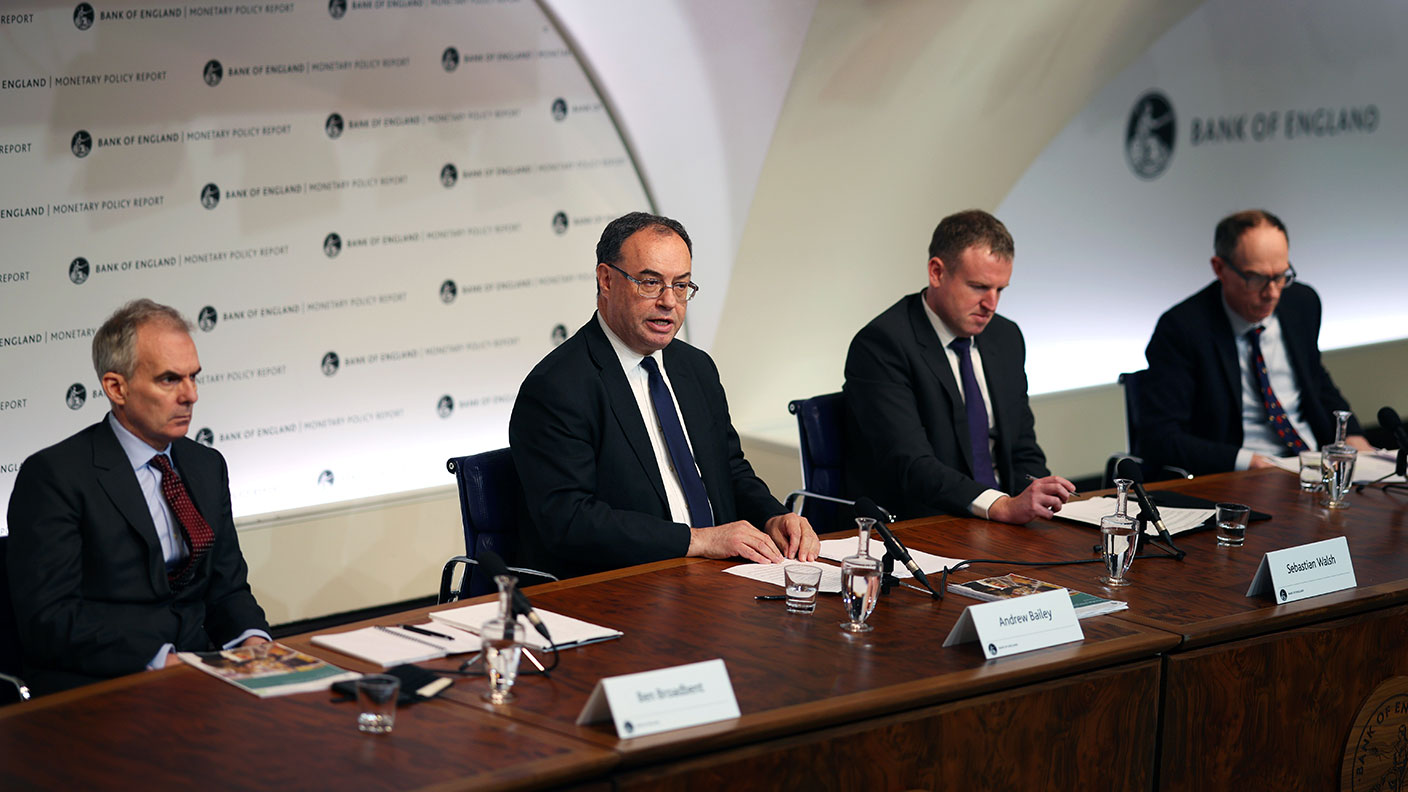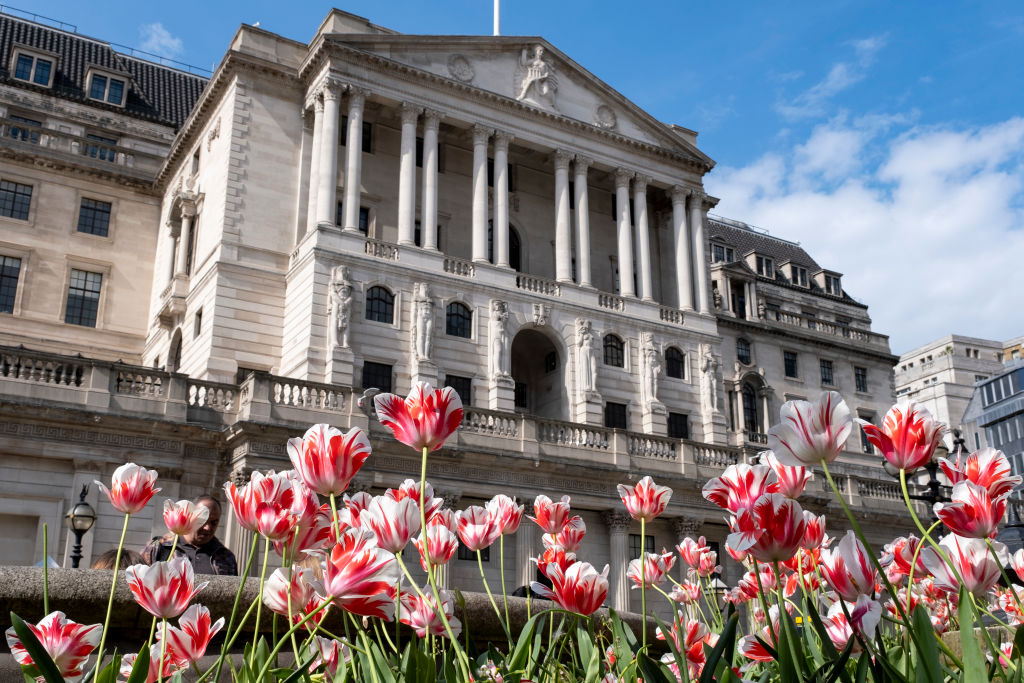Bank of England raises interest rates to 0.5% and stops money-printing programme
The Bank of England has raised the key UK interest rate again – by a quarter of a percentage point to 0.5%. It's also going to cut back on its quantitative easing programme. John Stepek explains what it means for you.


Get the latest financial news, insights and expert analysis from our award-winning MoneyWeek team, to help you understand what really matters when it comes to your finances.
You are now subscribed
Your newsletter sign-up was successful
Want to add more newsletters?

Twice daily
MoneyWeek
Get the latest financial news, insights and expert analysis from our award-winning MoneyWeek team, to help you understand what really matters when it comes to your finances.

Four times a week
Look After My Bills
Sign up to our free money-saving newsletter, filled with the latest news and expert advice to help you find the best tips and deals for managing your bills. Start saving today!
Today, the Bank of England raised the key UK interest rate by a quarter of a percentage point to 0.5%. That’s exactly what it was expected to do. It did so by five votes to four – in other words, five members of the nine-member rate-setting Monetary Policy Committee voted in line with market expectations.
However, what has rather taken markets aback is the fact that the other four – as you might assume – did not vote to keep rates at 0.25%. No, they voted to raise rates by a full half a percentage point, to 0.75%.
For perspective, obviously, this is still very near an all-time low. But from a different perspective, the UK bank rate is now five times higher than it was a scant two months ago (rates went up from 0.1% to 0.25% on 16 December last year).
MoneyWeek
Subscribe to MoneyWeek today and get your first six magazine issues absolutely FREE

Sign up to Money Morning
Don't miss the latest investment and personal finances news, market analysis, plus money-saving tips with our free twice-daily newsletter
Don't miss the latest investment and personal finances news, market analysis, plus money-saving tips with our free twice-daily newsletter
Quantitative easing programme to be unwound
Moreover, the Bank is going to unwind quantitative easing (QE). QE involves printing money to buy assets. Those assets – mostly government bonds – sit on the Bank’s balance sheet. One key point about bonds is that they eventually mature; thus far, the Bank has been maintaining QE by reinvesting the proceeds of maturing bonds as they do so.
The Bank is now going to stop doing that. So, in effect, when government bonds held by the Bank of England reach their payback date, the government will need to find a new borrower to lend them the money to repay that loan (whereas previously it would just have “rolled over”). That’ll amount to just over £70bn bonds during 2022 and 2023, and another £130bn over 2024 and 2025.
On top of that, the Bank is also going to sell off the corporate bonds that it has purchased.
Most importantly, the Bank’s attitude has changed drastically. In November, markets were also shocked, but back then, it was because Andrew Bailey, head of the Bank, had led them to believe that a rate rise was a dead cert, then switched tack at the last minute.
Now, inflation is public enemy number one again. It’s expected to peak at 7.25% in April – remember, this is the CPI measure, so RPI could easily be just under double-digits by that point (here’s what the difference between CPI and RPI inflation is, and why it matters).
That’s even while the Bank is warning consumers that there are tough times ahead. It reckons that the squeeze on spending created mostly by higher energy prices (though it nods to the increase in National Insurance scheduled for April too), along with excess supply building up as supply chain bottlenecks ease off, is going to drive the unemployment rate up to 5% by the middle of next year.
Meanwhile, energy prices might stop contributing to higher inflation rates but only because they “are assumed to remain constant after six months”. How realistic that assumption is is hard to judge, but even if energy prices remain where they are, that is quite the squeeze on consumer spending.
Get ready for stagflation
None of these things is inflationary in the sense of making the economy overheat. They are stagflationary, in the sense that prices rise but the price rises themselves choke off growth. If your energy bill goes up by 50%, that’s money you can’t spend on anything else; it does not boost demand in the economy.
The Bank even acknowledges this. “The sharp rises in prices of global energy and tradable goods of which the UK is a net importer will necessarily weigh on UK real aggregate income and spending. This is something monetary policy is unable to prevent.”
So why is the Bank raising rates then? “The role of monetary policy is to ensure that, as such a real economic adjustment occurs, it does so consistent with achieving the 2% inflation target sustainably in the medium term, while minimising undesirable volatility in output.”
I have to admit that this mostly sounds to me like pure self-justifying gobbledegook. The Bank will be told off for not meeting the 2% inflation target. By raising rates a bit, it can at least say “but we’re trying”.
Anyway – if you have a variable-rate mortgage, you’ll notice the difference quite quickly, so maybe consider switching. If you have savings, you’ll notice the difference rather more slowly I suspect, so it might be worth starting to shop around there too – though I wouldn’t lock in any rates yet, given that more rises are apparently set to come.
Get the latest financial news, insights and expert analysis from our award-winning MoneyWeek team, to help you understand what really matters when it comes to your finances.

-
 Should you buy an active ETF?
Should you buy an active ETF?ETFs are often mischaracterised as passive products, but they can be a convenient way to add active management to your portfolio
-
 Power up your pension before 5 April – easy ways to save before the tax year end
Power up your pension before 5 April – easy ways to save before the tax year endWith the end of the tax year looming, pension savers currently have a window to review and maximise what’s going into their retirement funds – we look at how
-
 Why Scotland's proposed government bonds are a terrible investment
Why Scotland's proposed government bonds are a terrible investmentOpinion Politicians in Scotland pushing for “kilts” think it will strengthen the case for independence and boost financial credibility. It's more likely to backfire
-
 How have central banks evolved in the last century – and are they still fit for purpose?
How have central banks evolved in the last century – and are they still fit for purpose?The rise to power and dominance of the central banks has been a key theme in MoneyWeek in its 25 years. Has their rule been benign?
-
 UK to have highest inflation among advanced economies this year and next, says IMF
UK to have highest inflation among advanced economies this year and next, says IMFThe International Monetary Fund (IMF) says it expects inflation to remain high in the UK, while lowering economic growth forecasts for 2026.
-
 Is Britain heading for a big debt crisis?
Is Britain heading for a big debt crisis?Opinion Things are not yet as bad as some reports have claimed. But they sure aren’t rosy either, says Julian Jessop
-
 'Britain is on the road to nowhere under Labour'
'Britain is on the road to nowhere under Labour'Opinion Britain's economy will shake off its torpor and grow robustly, but not under Keir Starmer's leadership, says Max King
-
 'Governments are launching an assault on the independence of central banks'
'Governments are launching an assault on the independence of central banks'Opinion Say goodbye to the era of central bank orthodoxy and hello to the new era of central bank dependency, says Jeremy McKeown
-
 Why investors can no longer trust traditional statistical indicators
Why investors can no longer trust traditional statistical indicatorsOpinion The statistical indicators and data investors have relied on for decades are no longer fit for purpose. It's time to move on, says Helen Thomas
-
 Live: Bank of England holds UK interest rates at 4.5%
Live: Bank of England holds UK interest rates at 4.5%The Bank of England voted to hold UK interest rates at their current level of 4.5% in March, as widely anticipated, after inflation rose to 3% in January